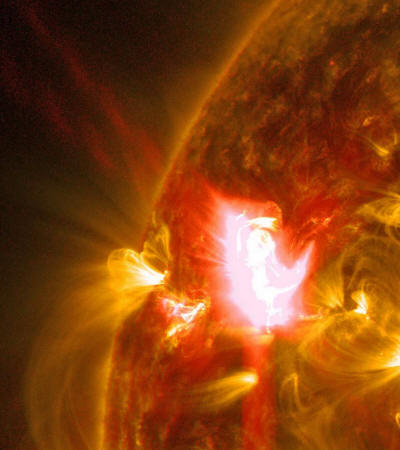|

April 2, 2014
from
NASA Website
A mid-level flare, an M6.5, erupted from the sun on April 2, 2014,
peaking at 10:05 a.m. EDT. This image from NASA's Solar Dynamics
Observatory shows the flare in a blend of two wavelengths of extreme
ultraviolet light:
131 Angstroms and 171 Angstroms, colorized in
yellow and red, respectively.

Image Credit
NASA/SDO/Goddard Space Flight Center
On April 2, 2014, the sun emitted a mid-level solar flare, peaking
at 10:05 a.m. EDT, and NASA's
Solar Dynamics Observatory captured
imagery of the event.
Solar flares are powerful bursts of
radiation. Harmful radiation from a flare cannot pass through
Earth's atmosphere to physically affect humans on the ground,
however - when intense enough - they can disturb the atmosphere in
the layer where GPS and communications signals travel.
To see how this event may impact Earth, please visit NOAA's
Space
Weather Prediction Center, the U.S.
government's official source for space weather forecasts, alerts,
watches and warnings.
This flare is classified as an M6.5 flare.
M-class flares are ten
times less powerful than the most intense flares, which are labeled
X-class. The number after the M provides more information about its
strength. An M2 is twice as intense as an M1, an M3 is three times
as intense, etc.
Updates will be provided as needed.
Related Report:
|

